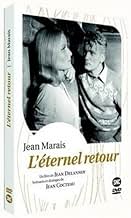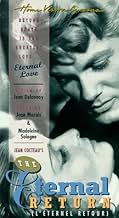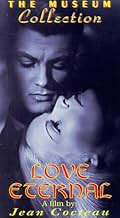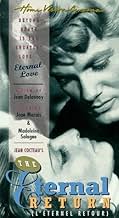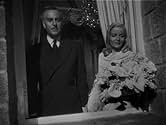Adicionar um enredo no seu idiomaThis is a retelling of Tristan and Isolde, set in 1940s France. The script was written by Jean Cocteau.This is a retelling of Tristan and Isolde, set in 1940s France. The script was written by Jean Cocteau.This is a retelling of Tristan and Isolde, set in 1940s France. The script was written by Jean Cocteau.
Avaliações em destaque
Director Jean Delannoy had intended making the legend of Tristram and Yseult as an historical film but budgetary constraints obliged him to film it in modern dress. Enter poet Jean Cocteau who envisaged this as a vehicle for his 'protegé' Jean Marais.
Taking its title from Nietzsche's 'Thus Spake Zarathustra', Cocteau has imbued his screenplay with what he called 'the marvellous' which he defined as 'that which removes us from the confines within which we have to live.' This of course was manna from heaven for those living under German occupation. Such escapist fare was adored by the public although the critics in their infinite wisdom were less enthusiastic and regarded it as too 'Aryan'. In Britain it was dismissed as 'Teutonic mysticism' and Monsieur Marais described as a cross between Lohengrin and Horst Wessel!
Almost eighty years on however it remains one of the most poetic and beautiful of films. Delannoy is truly blessed to have the services of production designer Georges Wahkévitch, cinematographer Roger Hubert and composer Georges Auric.
Jean Marais' athletic physique and chiselled features make him perfect casting as Patrice and he is complemented by the cool and mysterious Madeleine Solange as Nathalie la blonde. Ironically it was Mlle Solange's perceived chumminess with the Vichy regime that was to damage her career.
Delannoy has drawn splendid performances from Jean Murat, Junie Astor, Yvonne de Bray, Roland Toutain, Jeanne Marken and Alexandre Rignault whilst Périel is unforgettable as the destructive dwarf. The presence of canine chum Moulouk is inspired.
The final apotheosis of the doomed lovers is one of the most memorable scenes on film and cannot fail to move all but the hardest hearted.
Taking its title from Nietzsche's 'Thus Spake Zarathustra', Cocteau has imbued his screenplay with what he called 'the marvellous' which he defined as 'that which removes us from the confines within which we have to live.' This of course was manna from heaven for those living under German occupation. Such escapist fare was adored by the public although the critics in their infinite wisdom were less enthusiastic and regarded it as too 'Aryan'. In Britain it was dismissed as 'Teutonic mysticism' and Monsieur Marais described as a cross between Lohengrin and Horst Wessel!
Almost eighty years on however it remains one of the most poetic and beautiful of films. Delannoy is truly blessed to have the services of production designer Georges Wahkévitch, cinematographer Roger Hubert and composer Georges Auric.
Jean Marais' athletic physique and chiselled features make him perfect casting as Patrice and he is complemented by the cool and mysterious Madeleine Solange as Nathalie la blonde. Ironically it was Mlle Solange's perceived chumminess with the Vichy regime that was to damage her career.
Delannoy has drawn splendid performances from Jean Murat, Junie Astor, Yvonne de Bray, Roland Toutain, Jeanne Marken and Alexandre Rignault whilst Périel is unforgettable as the destructive dwarf. The presence of canine chum Moulouk is inspired.
The final apotheosis of the doomed lovers is one of the most memorable scenes on film and cannot fail to move all but the hardest hearted.
This movie was written by Jean Cocteau and it's pretty obvious due to the odd plot twists, romantic tone and mythological roots to the plot. Just a few years later, he was to BOTH write and direct Beauty and the Beast and Orpheus. These two are better films than The Eternal Return, though this movie is still worth watching--particularly as it shows and evolution of Cocteau's ideas. So, this movie is sort of like and unpolished version of these two later movies in many ways--particularly Orpheus. Absent from this film are the odd camera tricks but the story elements are all here.
The love between the two main characters is best described as a combination of the tragic stories of Orpheus and Eurydice along with Romeo and Juliet, but I have recently been informed that the story is ACTUALLY a reworking of the story of Tristan and Isolde. Thrown in for good measure are a malevolent dwarf, the dwarf's detestable parents and a lot of cool plot twists.
However, there were a few things that just didn't work out well in the movie. First, when it was obvious that the crazed dwarf had tried to kill the lovers by offering them what he thought was poison, nothing was done to punish him or place him in an institute for the criminally insane. This is pretty prudent considering what the dwarf does LATER in the story! Second, I hate movies that feature ladies fainting. Unless there is a blow to the head or they've gone without eating for a very extended period of time, people DON'T just faint. This is such a stupid cliché and I'm a little surprised that anyone as innovative and intelligent as Cocteau would resort to this device.
Other than that, it's a nice film.
FYI--An IMPORTANT warning: The video I watched was from The International Collection from Nelson Entertainment. If there are any OTHER companies that make this video, try them first!!!! The captioning was absolutely horrible!! Often, much of the dialog was not subtitled or very long statements were boiled down to one or two words!!! They showed very little respect for the integrity of the movie!
The love between the two main characters is best described as a combination of the tragic stories of Orpheus and Eurydice along with Romeo and Juliet, but I have recently been informed that the story is ACTUALLY a reworking of the story of Tristan and Isolde. Thrown in for good measure are a malevolent dwarf, the dwarf's detestable parents and a lot of cool plot twists.
However, there were a few things that just didn't work out well in the movie. First, when it was obvious that the crazed dwarf had tried to kill the lovers by offering them what he thought was poison, nothing was done to punish him or place him in an institute for the criminally insane. This is pretty prudent considering what the dwarf does LATER in the story! Second, I hate movies that feature ladies fainting. Unless there is a blow to the head or they've gone without eating for a very extended period of time, people DON'T just faint. This is such a stupid cliché and I'm a little surprised that anyone as innovative and intelligent as Cocteau would resort to this device.
Other than that, it's a nice film.
FYI--An IMPORTANT warning: The video I watched was from The International Collection from Nelson Entertainment. If there are any OTHER companies that make this video, try them first!!!! The captioning was absolutely horrible!! Often, much of the dialog was not subtitled or very long statements were boiled down to one or two words!!! They showed very little respect for the integrity of the movie!
The first Cocteau/Delannoy collaboration.That would not be the only one ("la Princesse de Clèves,1961).
Like "les Visiteurs du Soir" ,"l'Eternel Retour" was the typical Occupation movie : a way to keep reality away .But whereas Carné's work was hailed as an attack against Hitler (Jules Berry's devil was supposed to represent the Fuhrer),Cocteau-Delannoy's fans was sometimes accused of germanophilia.But with hindsight,it's talking nonsense:even if Patrice was a fair-haired Tristan,Jean Marais joined the army and he fought against Nazi Germany.One thing for sure: Jean Marais made his sweater fashionable,and Madeleine Sologne did the same with her hairdo.
This is the "Tristan and Isolde" legend transposed to the contemporary era.Tristan becomes Patrice,Isolde becomes Nathalie (one of the two Nathalie because,like in the story,there are two of them),King Mark simply turns into "Oncle Marc".The dwarf,Frossin,is also featured and is played by Piéral who also appeared in "La Princesse de Clèves" and many historical films.This is really a good directing job by Jean Delannoy,too often slagged off by the Young Turks of the New Wavelet.The castle and the misty banks of the lake are haunting.And Jean Marais is ideally cast as Patrice/Tristan.
If you are interested in the FRench cinema,this is essential viewing.
Like "les Visiteurs du Soir" ,"l'Eternel Retour" was the typical Occupation movie : a way to keep reality away .But whereas Carné's work was hailed as an attack against Hitler (Jules Berry's devil was supposed to represent the Fuhrer),Cocteau-Delannoy's fans was sometimes accused of germanophilia.But with hindsight,it's talking nonsense:even if Patrice was a fair-haired Tristan,Jean Marais joined the army and he fought against Nazi Germany.One thing for sure: Jean Marais made his sweater fashionable,and Madeleine Sologne did the same with her hairdo.
This is the "Tristan and Isolde" legend transposed to the contemporary era.Tristan becomes Patrice,Isolde becomes Nathalie (one of the two Nathalie because,like in the story,there are two of them),King Mark simply turns into "Oncle Marc".The dwarf,Frossin,is also featured and is played by Piéral who also appeared in "La Princesse de Clèves" and many historical films.This is really a good directing job by Jean Delannoy,too often slagged off by the Young Turks of the New Wavelet.The castle and the misty banks of the lake are haunting.And Jean Marais is ideally cast as Patrice/Tristan.
If you are interested in the FRench cinema,this is essential viewing.
10QwikBall
I thought this film was genius. For this implicit portrayal of Nazi politics to be made in Vichy France is astounding. The sinister Achille is one of the most shockingly real characters I've ever seen. If you speak French, see this movie (do NOT rely on the subtitling...it's shoddy).
Jean Cocteau's influence is indelible in this clever and sophisticated romance. Cocteau is at his most affecting when he adapts popular themes - in this case the Arthurian legend of Tristan and Isolde - and gives them a verisimilitude that challenges even modern sensibilities.
Patrice (Jean Marais) is a stunningly handsome young man who is supremely confident of his legacy. An orphan, his Uncle Marc clearly favors him over his cousin Achille (Pierre Perial), a malevolent dwarf who is as stunted morally as he is physically. Who can blame him? Achille is the son of Marc's wife's sister Gertrude (Yvonne de Bray) an eternally scheming, gossiping shrew who clearly has designs over Marc's fortune. Things come to a head after Patrice playfully sics his dog on Achille and Gertrude uses this incident to harass her brother-in-law. Marc agrees to let Patrice find him a young wife who would help him weather the strain of living with his no-good relatives, as well as revenge himself upon Gertrude for making his life as unpleasant as possible.
Patrice manages to find Nathalie, a orphan like himself, a beautiful foreigner who lives in constant fear of a drunken brute who threatens to marry, then eventually kill her. He comes to her rescue and when he proposes marriage, she is overwhelmed that the dashing Patrice has appeared - like some deus ex machine - offering her a way out of a mean and harrowing life, but not in the way she had hoped.
What astounded me about this film was how Cocteau was able to establish within a few scenes the tensions that underline the malevolence and envy of Marc and Patrice's dysfunctional in laws, Achille and Gertrude, roles which were marvelously acted. They never descend into hand-wringing caricatures because their evil is presented as something as arbitrary as their circumstances which, as Gertrude asserts and Marc himself acknowledges, are unfair. When these characters are away from the scene, the movie tends to lose its harrowing emotional depth. When other characters are introduced in the story, although these characters are also nicely fleshed out and wonderfully acted, you can't help but think that they would never hold a candle to Achille and Gertrude.
As for Patrice, you can't help but wonder at the way the blonde behemoth lights up the screen whenever he strides into the frame. But the film makers thankfully resisted the temptation to just make the character eye candy: despite being dashing and heroic, he can also be remarkably selfish, immature and casually cruel. I can't be sure if it's just bad subtitles but his callous treatment of Achille is cause for grounds. He takes digs at his cousin's deformity and despite claiming that his pet doesn't bite, he sics his dog on someone who isn't much larger than a child. Typical of his callousness is the way he dangles an impossibly wonderful life in front of the tragic, hapless Nathalie, only to make plain his real intentions later on. When she does accept his proposal, you wonder if it was because she had backed herself into a corner from which she couldn't hope to get out of. Hers was essentially a choice of the lesser evil: living in close proximity with a man whom she clearly loves but never being able to possess him, as opposed to living with a man whom she despises and threatens her harm.
When the film was released, the shining couple of the story was either held up as an example of the ideal pairing of male and female beauty, or as noxious pro-Aryan Nazi propaganda, and it CAN BE unsettling how so Nordic these two people are that their blondeness just leaps out and clubs you on the head despite the fact that the film is in black and white. It doesn't help that the final tableau and the opening frame of a giant hand cannot escape allusions to Nazi imagery - perhaps these were thrown in to help the movie get made. Yet it also made sense - for Patrice and Nathalie indeed look like they were made for each other (their common features and origins are explained) and the beauty that had marked them out for happy ever after begets the envy that eventually destroys them.
All in all, a film that deserves to be studied as seriously as the more landmark films in Cocteau's oeuvre.
Patrice (Jean Marais) is a stunningly handsome young man who is supremely confident of his legacy. An orphan, his Uncle Marc clearly favors him over his cousin Achille (Pierre Perial), a malevolent dwarf who is as stunted morally as he is physically. Who can blame him? Achille is the son of Marc's wife's sister Gertrude (Yvonne de Bray) an eternally scheming, gossiping shrew who clearly has designs over Marc's fortune. Things come to a head after Patrice playfully sics his dog on Achille and Gertrude uses this incident to harass her brother-in-law. Marc agrees to let Patrice find him a young wife who would help him weather the strain of living with his no-good relatives, as well as revenge himself upon Gertrude for making his life as unpleasant as possible.
Patrice manages to find Nathalie, a orphan like himself, a beautiful foreigner who lives in constant fear of a drunken brute who threatens to marry, then eventually kill her. He comes to her rescue and when he proposes marriage, she is overwhelmed that the dashing Patrice has appeared - like some deus ex machine - offering her a way out of a mean and harrowing life, but not in the way she had hoped.
What astounded me about this film was how Cocteau was able to establish within a few scenes the tensions that underline the malevolence and envy of Marc and Patrice's dysfunctional in laws, Achille and Gertrude, roles which were marvelously acted. They never descend into hand-wringing caricatures because their evil is presented as something as arbitrary as their circumstances which, as Gertrude asserts and Marc himself acknowledges, are unfair. When these characters are away from the scene, the movie tends to lose its harrowing emotional depth. When other characters are introduced in the story, although these characters are also nicely fleshed out and wonderfully acted, you can't help but think that they would never hold a candle to Achille and Gertrude.
As for Patrice, you can't help but wonder at the way the blonde behemoth lights up the screen whenever he strides into the frame. But the film makers thankfully resisted the temptation to just make the character eye candy: despite being dashing and heroic, he can also be remarkably selfish, immature and casually cruel. I can't be sure if it's just bad subtitles but his callous treatment of Achille is cause for grounds. He takes digs at his cousin's deformity and despite claiming that his pet doesn't bite, he sics his dog on someone who isn't much larger than a child. Typical of his callousness is the way he dangles an impossibly wonderful life in front of the tragic, hapless Nathalie, only to make plain his real intentions later on. When she does accept his proposal, you wonder if it was because she had backed herself into a corner from which she couldn't hope to get out of. Hers was essentially a choice of the lesser evil: living in close proximity with a man whom she clearly loves but never being able to possess him, as opposed to living with a man whom she despises and threatens her harm.
When the film was released, the shining couple of the story was either held up as an example of the ideal pairing of male and female beauty, or as noxious pro-Aryan Nazi propaganda, and it CAN BE unsettling how so Nordic these two people are that their blondeness just leaps out and clubs you on the head despite the fact that the film is in black and white. It doesn't help that the final tableau and the opening frame of a giant hand cannot escape allusions to Nazi imagery - perhaps these were thrown in to help the movie get made. Yet it also made sense - for Patrice and Nathalie indeed look like they were made for each other (their common features and origins are explained) and the beauty that had marked them out for happy ever after begets the envy that eventually destroys them.
All in all, a film that deserves to be studied as seriously as the more landmark films in Cocteau's oeuvre.
Você sabia?
- CuriosidadesParis box office: 10,511,384 French francs (11-1-1944).
- Versões alternativasThere is an Italian edition of this film on DVD, distributed by DNA Srl: "LES DAMES DU BOIS DE BOULOGNE (Perfidia, 1945) + L'ÉTERNEL RETOUR (L'immortale leggenda, 1943)" (2 Films on a single DVD), re-edited with the contribution of film historian Riccardo Cusin. This version is also available for streaming on some platforms.
- ConexõesFeatured in Pink Ulysses (1990)
Principais escolhas
Faça login para avaliar e ver a lista de recomendações personalizadas
Detalhes
- Tempo de duração
- 1 h 47 min(107 min)
- Cor
- Proporção
- 1.37 : 1
Contribua para esta página
Sugerir uma alteração ou adicionar conteúdo ausente

